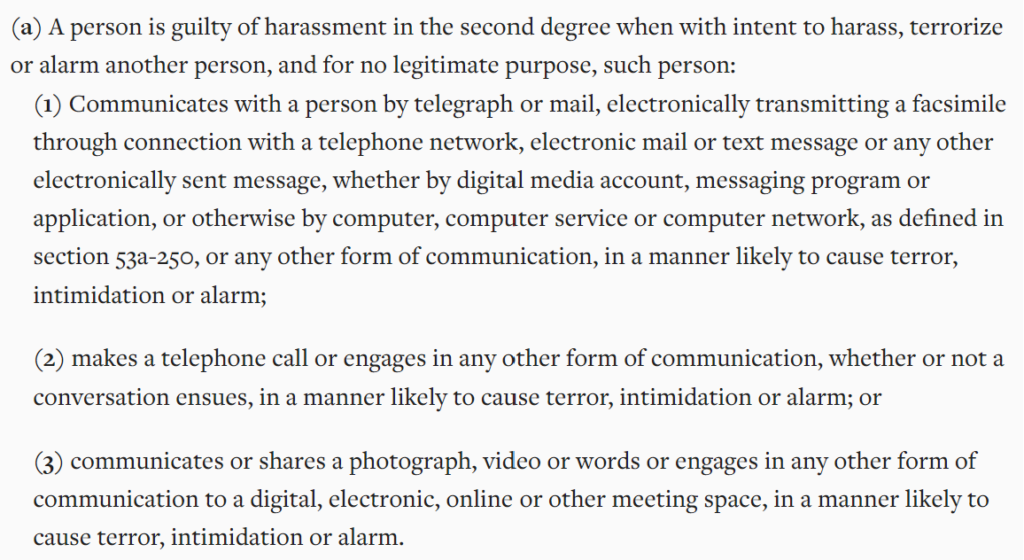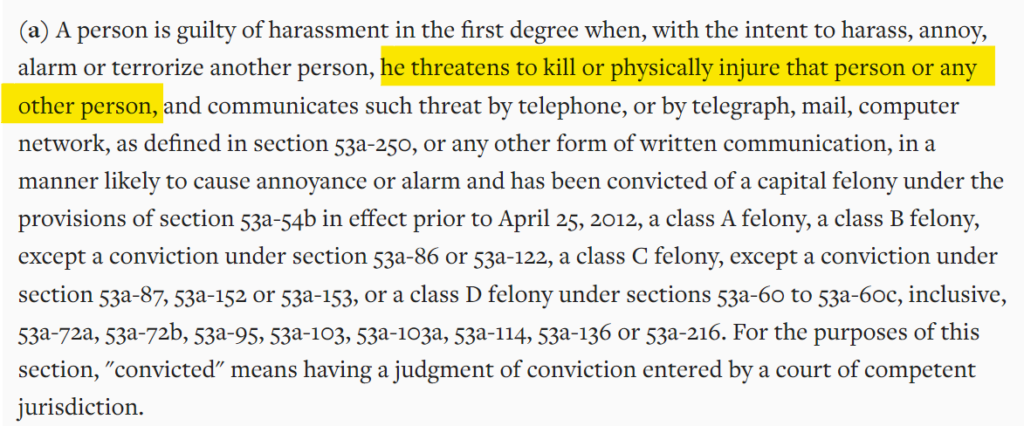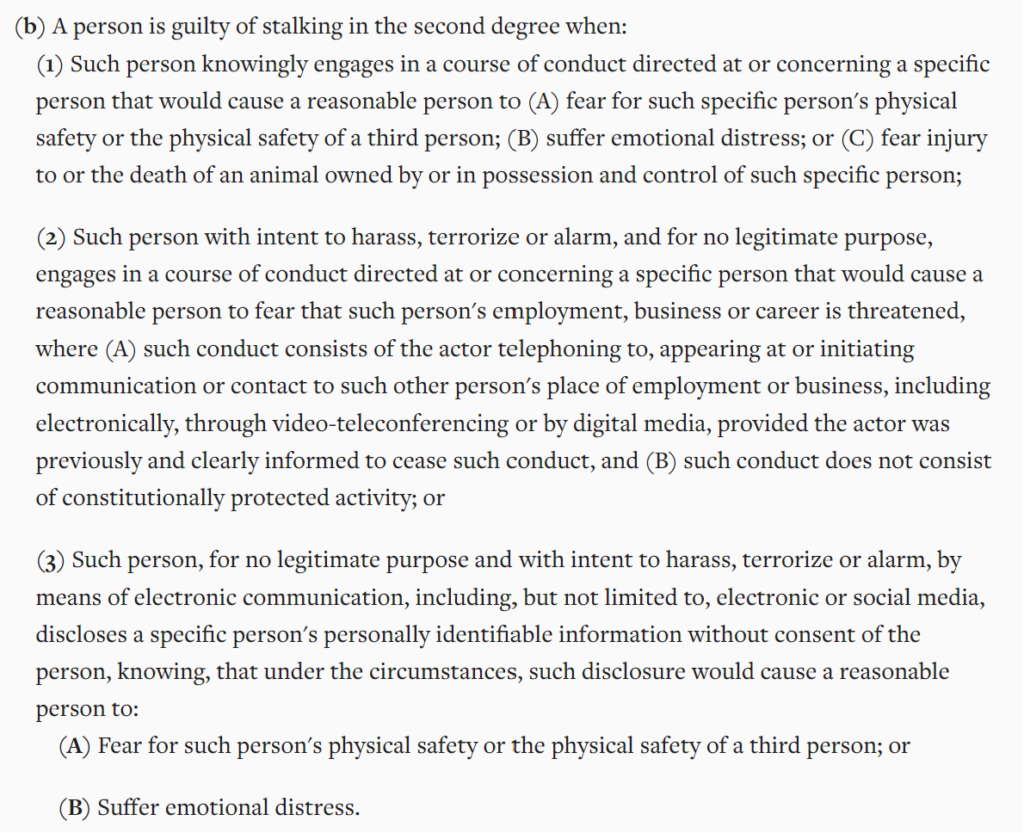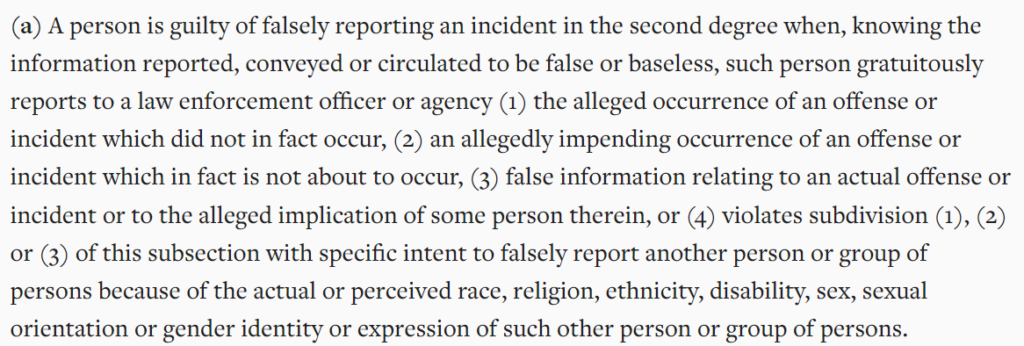Is Doxxing Illegal In Connecticut?
Laura Martisiute
Reading time: 6 minutes

Table of Contents
If you live in Connecticut and want to protect your online safety, you may have asked yourself: Is doxxing illegal in Connecticut?
In this guide, we review whether or not doxxing is considered a crime in Connecticut and go over what doxxing-related activities are definitely going to result in criminal penalties in the state.
Is Doxxing Illegal In Connecticut?
Doxxing, or publishing someone else’s personal information online without their permission, is considered a crime in Connecticut under Conn. Gen. Stat. § 53a-181d, otherwise known as the state’s stalking law.
Doxxing and stalking have similarities in how perpetrators enact the crimes and their intention (harassing and terrorizing their victims), so it makes sense that the two are connected.

Definition of “personal information” under Connecticut anti-doxxing law
Under Connecticut’s anti-doxxing law, “personal information” refers to any identifying information, including someone’s:
- Name
- Mother’s maiden name
- Social Security number
- Date of birth
- Home address
- Telephone number
- Biometric data.
Connecticut’s definition of personal information also includes any information that could be linked to someone, including their health records, financial documents, or education and employment history.
It also includes any sensitive information about someone’s gender identity or sexual orientation (along with any “sexually intimate visual depictions”).
Penalties for doxxing someone in Connecticut
The penalty for stalking and doxxing is a Class A misdemeanor in Connecticut, meaning perpetrators could face up to one year in jail and/or a fine of up to $2,000.
Doxxing Related Activities That Are Illegal in Connecticut
Doxxing is closely associated with other illegal activities, each of which Connecticut has particular penalties for.
Harassment
Harassment is a somewhat broadly defined law in Connecticut. Harassment in the second degree (Conn. Gen. Stat. § 53a-183) encompasses any not-in-person communication (such as via phone, email, text, or otherwise) intended to cause “terror, intimidation, or alarm.”

In Connecticut, harassment is a class C misdemeanor that can net the perpetrator up to three months in jail and/or a $500 fine.
If someone uses the above methods to communicate an intent to kill or seriously injure another person (Conn. Gen. Stat. § 53a-182b), then it’s a class D felony leading to one to five years in state prison and/or a $5,000 fine.

Stalking
Like harassment, stalking is punishable by degrees in Connecticut.
Stalking in the third degree (Conn. Gen. Stat. § 53a-181e) is defined as recklessly (rather than intentionally or deliberately) following or lying in wait for someone to the point that the other person fears for their safety or suffers emotional distress.

It’s a Class B misdemeanor punishable by up to six months in jail and/or a $1,000 fine.
Stalking in the second degree (Conn. Gen. Stat. § 53a-181d) is defined as intentionally following or lying in wait for someone to the point that the other person fears for their safety or suffers emotional distress. It also encompasses doxxing (as discussed above).

Repeat offenders, as well as adults targeting minors and those who are stalking another person due to their race, ethnicity, religion, sex, sexual orientation, disability, or gender identity or expression, are guilty of stalking in the first degree (Conn. Gen. Stat. § 53a-181c).
They face a Class D felony with penalties of one to five years imprisonment and/or up to a $5,000 fine.

Falsely reporting an incident
The act of calling law enforcement to report a fake crime (also known as swatting) is covered under Connecticut’s legal code as “falsely reporting an incident” (Conn. Gen. Stat. § 53a-180c).

In most cases, it’s a Class A misdemeanor, leading to up to one year in jail and/or a $2,000 fine.
Falsely reporting an incident is a Class E felony if the victim was targeted due to race, religion, ethnicity, disability, sex, sexual orientation, or gender identity or expression.
In those cases, the penalty climbs to up to three years in prison and/or a $3,500 fine.
Is Doxxing Illegal at the Federal Level?
At present, there is no federal doxing law in the US, which means that publishing someone else’s personal information is not illegal at the federal level.
That said, more and more states (including Connecticut but also California, Arizona, and Illinois) are enacting doxxing laws.
However, even with legal protection at the state level, it’s important for Connecticut residents to take their online safety into their own hands. Connecticut laws won’t help you until you’re doxxed, but once your information is out there, it’s hard to get it back.
How to Protect Yourself Against Doxxing In Connecticut (And Elsewhere)
To prevent doxxing, minimize your online footprint. To do so, you need to get an idea of where your information is online and then either hide or remove it.
Your first step should be to dox yourself (follow our guide on self-doxxing with these doxxing tools for step-by-step instructions). Doing so will give you a good idea of where your personal data vulnerabilities are and how to plug them up.
Once you’ve done so, you’ll likely need to take several steps to make yourself undoxxable. That generally includes:
- Opting out of data brokers (companies that collect and sell your personal information for a minimal fee). Note that because brokers relist your data when they find more of it, you’ll need to opt out repeatedly from each broker or subscribe to a data broker removal service such as DeleteMe to handle the opt-out process for you.
- Making your social media accounts private rather than public.
- Changing your usernames and passwords for each of your online accounts, and using unique ones for each new account you create moving forward.
- Requesting the removal of your data from Google services and Google Search.
- Avoiding giving out your personal information online.
To find out more, read our in-depth guide on how to prevent doxxing.
Our privacy advisors:
- Continuously find and remove your sensitive data online
- Stop companies from selling your data – all year long
- Have removed 35M+ records
of personal data from the web
Save 10% on any individual and
family privacy plan
with code: BLOG10
news?
Don’t have the time?
DeleteMe is our premium privacy service that removes you from more than 750 data brokers like Whitepages, Spokeo, BeenVerified, plus many more.
Save 10% on DeleteMe when you use the code BLOG10.
















